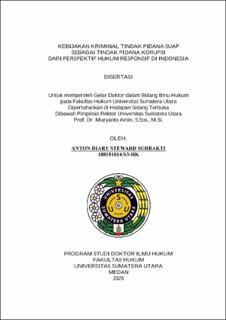Kebijakan Kriminal Tindak Pidana Suap sebagai Tindak Pidana Korupsi dari Perspektif Hukum Responsif di Indonesia
Criminal Policy on Bribery as a Criminal Act of Corruption from a Responsive Legal Perspective in Indonesia

Date
2025Author
Surbakti, Anton Diary Steward
Advisor(s)
Yunara, Edi
Saidin
Danil, Elwi
Metadata
Show full item recordAbstract
This dissertation examines the central issues concerning the implementation of criminal policy in addressing bribery as a form of corruption in Indonesia, the underlying factors contributing to bribery offenses, and the formulation of an ideal criminal policy on bribery from the perspective of responsive law in Indonesia. Using normative legal research methods, this study is based on secondary data obtained through document analysis, including primary, secondary, and tertiary legal materials. The findings conclude that an effective criminal policy to combat bribery as a corruption offense can be pursued through both penal and non-penal approaches. Penal policy is realized through the application of statutory provisions, such as the Indonesian Penal Code (KUHP), Law No. 11 of 1980 on Bribery, and Law No. 31 of 1999 as amended by Law No. 20 of 2001 on the Eradication of Corruption. Non-penal policies include approaches such as anti-corruption education, transparency and bureaucratic reform, whistleblower protection and reporting systems, public campaigns and community involvement, and structural-economic strategies. A key contribution of this research is the incorporation of a theological-ethical framework based on the biblical doctrine of Imago Dei—the belief that human beings are created in the image and likeness of God, as stated in Genesis 1:26: “Let Us make man in Our image, according to Our likeness.” This perspective affirms the inherent dignity, moral responsibility, and unique value of every individual. The integration of Imago Dei with a responsive criminal law approach promotes a restorative paradigm of justice that values human dignity, even in the context of legal transgression. It emphasizes rehabilitation, reconciliation, and social justice, positioning criminal law not merely as a tool of social control but as a medium for repentance and transformation. This anti-reductionist stance resists the tendency to reduce individuals to mere “risk scores” or “criminal cases,” instead advocating for an ecosystemic approach that views crime as a disruption in the relational harmony between humans, God, fellow beings, and the environment. As such, “Living law is a law that recognizes the image of the Creator in the victim, the offender, and the wounded creation.”
Collections
- Doctoral Dissertations [173]
